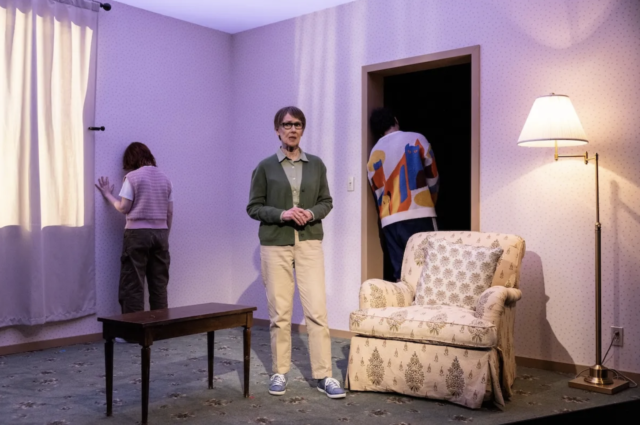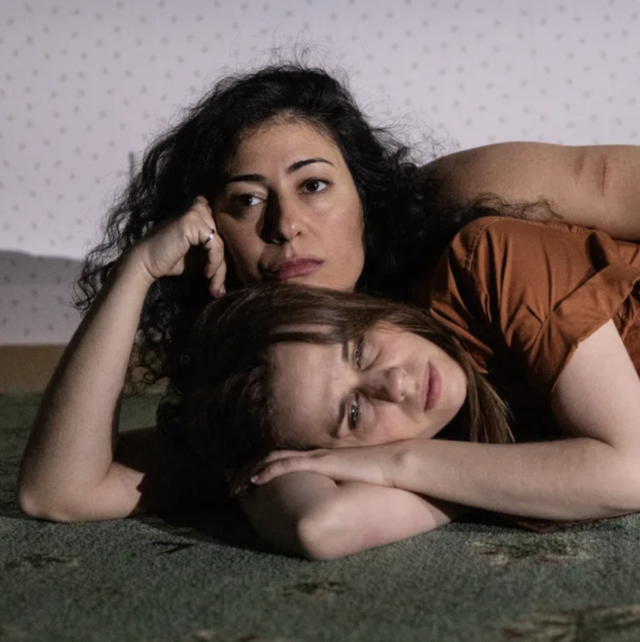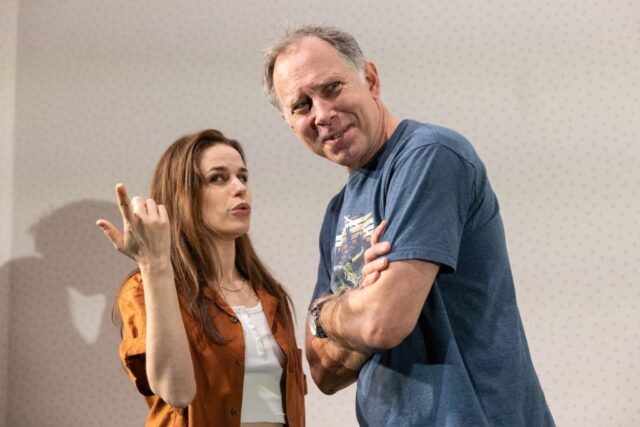
Aunt Bobbi (Susan Blommaert) shares her concept for a new kind of place to seek healing in Grief Hotel (photo © Maria Baranova)
GRIEF HOTEL
The Shiva Theater at the Public Theater
425 Lafayette St.
Monday – Saturday through April 27, $57.50
212-539-8500
publictheater.org
www.clubbedthumb.org
Don’t let the title of Clubbed Thumb’s Grief Hotel scare you off; the play, which has returned to the Public Theater after a 2023 Summerworks presentation, is much more than yet another show about death and healing. Instead, it’s a uniquely entertaining, thought-provoking, and darkly funny exploration of how humans deal with loneliness, lack of connection, and loss, of many kinds, from friends and lovers to jobs and homes. The night I went, the audience was packed with a college drama class of mostly female-identifying and nonbinary students who were loving every minute of it, a few calling out, snapping, and sharing their enjoyment, which was infectious.
A collaboration with New Georges, Grief Hotel is structured around a proposal by Aunt Bobbi (Susan Blommaert), who, for an assignment from a hotel chain, has made a picture book that encourages young people to come to what she calls the grief hotel, inspired by the case of Penelope, whose baby suffered a horrific injury. A fussy woman who looks like an old-fashioned librarian, Aunt Bobbi explains, “You can go there if your sibling gets deathly sick, or if you find out that the person you love doesn’t love you back, or if you commit manslaughter, et cet-ra. And so everything there — okay, so these are just my guesses — everything there is meant to heal you and this all has to be based on science. So the colors of the walls. Here’s a picture of green. The chairs. Some crystals. The beds. You can go on a walk. Or not. You have activities to heal you. Little. Animals.”
The one-room set, by Kimie Nishikawa of the dots collective, is influenced by the interior pictures of American photographer Todd Hido and echoes Aunt Bobbi’s description: It’s an obtuse trapezoid with three plainly papered walls, one open doorway, a window covered by a long shade, ordinary carpeting, a comfy chair, a floor lamp, and a small table. The room is slanted, larger stage left than right, where it is like a corner for time-outs. (At several points, characters stand still, facing the wall, punishing themselves by briefly hiding from the world.)
The white fabric ceiling helps produce compelling shadows of the characters that seem to live and breathe on their own, like doppelgängers or looming souls, furthering the mysteries of the narrative. The stunning lighting is by Masha Tsimring, with suburban-style costumes by Mel Ng and adept sound and music by Jordan McCree.
Aunt Bobbi continues, “There’s no alcohol at the grief hotel and there’s no Instagram. It really is getting better the Hard Way but it’s also an exclusive luxury bespoke experience. Beaucoup beaucoup expensive. Anyway, so this is a picture of Penelope feeling better because after her good bespoke activities and foods and all that she is ah. Healed. And other people paid for it. So that’s my creative expression.” The word “bespoke” is used numerous times throughout the play, referring to the “custom-made” experience of each person’s life.

Em (Nadine Malouf) and Winn (Ana Nogueira) explore their unique relationship in Clubbed Thumb’s Grief Hotel (photo © Maria Baranova)
The liminal space is populated by a half-dozen individuals who are often not at the same location but communicating over the phone or online; dialogue overlaps and intersects so it’s not always immediately clear when two or more people are actually physically together, as if we’re eavesdropping on more than one conversation at a time. For example, Aunt Bobbi, reading from her proposal, says that the name grief hotel “sounds a little sad.” Asher (Bruce McKenzie), texting Winn (Ana Nogueira), states as if in response to Aunt Bobbi, “Not cool.”
Winn, who describes herself as “a fundamentally unemotional person,” lives with the nonbinary Teresa (Susannah Perkins) but becomes interested in Asher, an older married man she has met on dating apps. Em (Nadine Malouf), Winn’s constantly perturbed college lover, is now with Rohit (Naren Weiss), a man who prefers life to be uncomplicated although he is afraid of death.
“I just want to bleed from my face until I die,” Em tells Winn. “I’m panicked about mortality actually. Incredibly panicked,” Rohit says to Aunt Bobbi.
The characters discuss love and sex, work and death, empty malls and AI, and queerness and sleeping through earthquakes over the course of eighty thoroughly charming and stimulating minutes. You’ll find yourself rooting for Winn and Asher to hook up, Em to be kind to Rohit (and herself), Teresa to be treated fairly by Winn, and Aunt Bobbi to keep sharing her unique impressions of the human condition.
Meanwhile, a horrific accidental death from twenty years before hovers over the sudden disappearance of an old high school friend, Stanley Chi — whose last name means “vital energy,” something all the characters could use.

Winn (Ana Nogueira) and Asher (Bruce McKenzie) contemplate what kind of relationship they might have, if any (photo © Maria Baranova)
Liza Birkenmeier’s (Dr. Ride’s American Beach House, F*ck7thGrade) dialogue crackles with ingenuity and wit as the plot continually surprises; the story is based on a real plan she offered in an ideation session for an innovation agency. Director Tara Ahmadinejad (Lunch Bunch, Karen, I Said) masterfully handles the distinct characters in the tight quarters, as if they’re in a sort of bardo, weighing their future against their nostalgic past.
The wonderful cast is led by Nogueira (Bob & Carol & Ted & Alice, Which Way to the Stage), whose Winn is afraid to face what she feels deep inside. McKenzie (STET, White Noise) has an offbeat charm as a famous person in search of privacy, his dry delivery yearning for things to be simpler than they are. Obie winner Malouf (The School for Scandal, A Bright Room Called Day) is a powder keg as Em, who is filled with rage that hides her insecurities. Weiss (Over Here, Letters of Suresh) is sweetly innocent as Rohit, a well-meaning man who walks around with his head in the clouds.
Obie winner Perkins (The Wolves, The Good John Proctor) excels as Teresa, who is the most sensible one of the group. “It’s damp in here and I’m worried it’s cognitively damaging,” they opine. And Blommaert (Dr. Ride’s American Beach House, 4000 Miles) has a ball with the pleasantly persnickety Aunt Bobbi, who shares all the right buzzwords — sustainability, wellness, intimacy, holistic well-being, community, empowerment, body-positivity, ethically sourced food origin stories — as she seeks to heal those in need of support.
Early on, Rohit lets Em know that he’s considering doing a cleanse. Later, after Rohit asks if she believes in any sort of god, Em replies, “My parents got an exorcism on my house,” a rather extreme cleanse. Grief Hotel requires no such cleansing.
In her proposal to the hotel chain, Aunt Bobbi offers, “You might wanna change that name because it doesn’t exactly sound delightful.” But as everyone declares in the stirring participatory finale, “Lord only knows where the road’s gonna go (go!).” In this case, the road goes to the delightful Grief Hotel at the Public’s Shiva Theater.
[Mark Rifkin is a Brooklyn-born, Manhattan-based writer and editor; you can follow him on Substack here.]